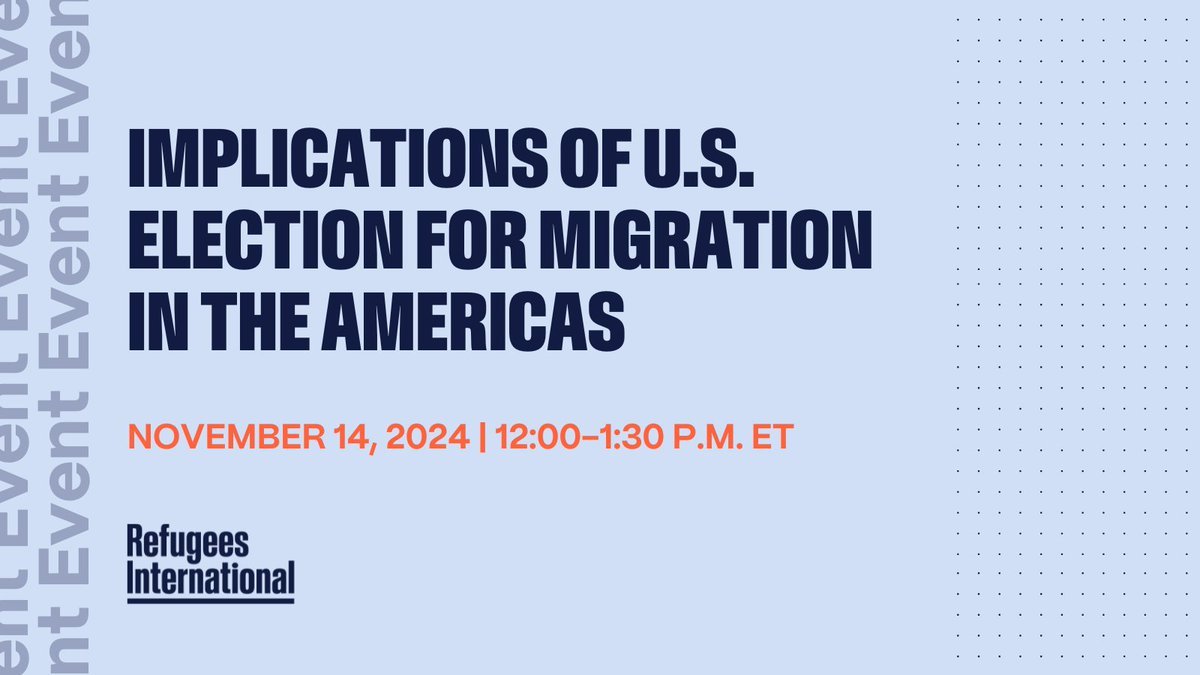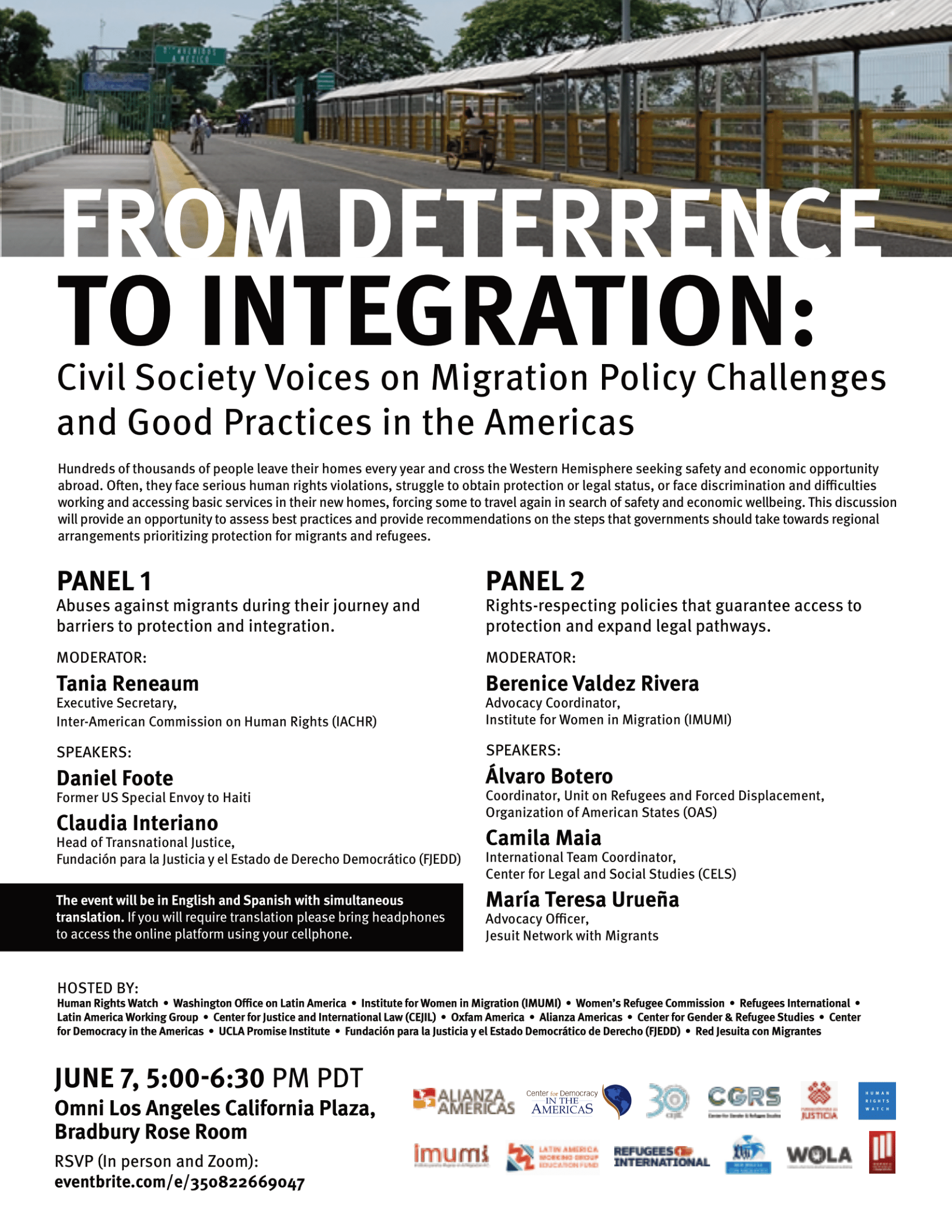
EVENTS

U.S. Election Implications on Migration Policy in the Americas
Organized by CEDA and Refugees International: In recent years, the Biden administration has shaped hemispheric migration policy through the LA Declaration on Migration and Protection, the introduction of the Safe Mobility Initiative, the expansion of alternative pathways, and bilateral negotiations and arrangements with other countries, especially Mexico and Panama. This webinar will explore potential shifts in U.S. migration policy following the election and the resulting impacts on regional cooperation and bilateral agreements; access to protection, pathways, and integration; and funding for enforcement and humanitarian efforts. The event will take place in English, with Spanish and Kreyol interpretation.
Moderator
Maria Jose Espinosa Carrillo, Executive Director, Center for Engagement and Advocacy in the Americas (CEDA)
Panelists
Francisca Vigaud-Walsh, Director of Strategy and Advocacy, CEDA
Yael Schacher, Director for the Americas and Europe, and Rachel Schmidtke, Senior Advocate for Latin America, Refugees International
Hannah Flamm, Deputy Director of Policy at International Refugee Assistance Project
Guerline Jozef, Executive Director, Haitian Bridge Alliance

VIRTUAL PANEL: UNDERSTANDING THE MAY 2024 OFAC UPDATE
Please join CEDA for a virtual panel to dive into the Cuba-related regulatory changes announced by OFAC on May 28, 2024.
The panel will be moderated by CEDA Executive Director, María José Espinosa, and will feature the following experts:
Dr. William LeoGrande
Dr. William LeoGrande is a Professor of Government and former dean of the American University School of Public Affairs. He is an expert in Latin American affairs.
Robert Muse
Robert Muse is a practicing lawyer with over thirty years’ experience in counseling companies and not-for-profit organizations on U.S. laws, regulations and policies relating to Cuba.
Oniel Díaz Castellanos
Oniel Díaz Castellanos is a Cuban entrepreneur and Founder of Auge, a consulting firm focused on the integrated development of businesses in Cuba.

CDA’S 15TH ANNIVERSARY EVENT: CELEBRATING DIALOGUE ACROSS THE AMERICAS
CDA is celebrating 15 years!
The Center for Democracy in the Americas will celebrate Celebrating Dialogue Across the Americas at the CDA 15th Anniversary Event on Friday, September 16 from 6:30-9:30pm at AutoShop - Union Market.
This year, CDA will honor Representative Jim McGovern (MA-2) for his work advocating for diplomatic engagement with Cuba and for a U.S. immigration system that responds to the realities of migration flows and migrant lives.
The event will pay tribute to individuals who have championed U.S. policy toward the Americas based on engagement and mutual respect, reflect on CDA’s accomplishments over the last 15 years, and feature live music from Cuban drummer Yissy García and her band.
We will also enjoy cuisine from a local Peruvian restaurant, Peruvian Brothers, as we reflect on CDA’s role in shaping U.S.-Cuba policy and regional migration policy.

A COMPOUNDING CRISIS: DOMESTIC SHORTCOMINGS, U.S. POLICIES, AND THE IMPACT ON EVERYDAY CUBANS
Although Cuba’s government has sought to spur economic growth in recent years by shrinking the state sector, encouraging greater foreign investment, and expanding the private sector, the sluggish implementation of these measures and the ongoing crisis has enacted a deep toll on the quality of life of the Cuban people. Some of the economic measures aimed at the long-term improvement of the Cuban economy have had a dire impact on the ability of Cuban families to survive. In practice, the crisis has meant that Cubans are forced to endure hours-long energy blackouts and stagnated incomes, extreme inflation, and a lack of basic goods and services. The goods that are available on the shelves are often more expensive or in hard-to-obtain currencies such as the U.S. dollar. Lower-income families and Afro-Cubans bear the brunt of this as not all have equal access to foreign currency from abroad. Remittances are one of the top sources for Cuba’s hard currency and play a major role in the ability of many Cuban families and the private sector to survive the ongoing economic crisis on the island. As the Biden administration continues to hold back specifics on how its recent measures will successfully be implemented, Cuban-Americans and others continue to struggle to support their loved ones on the island.
Cuba’s economic crisis—defined by extreme inflation, a shrinking GDP, the accumulation of social debts, goods shortages, high external dependency, and weak economic growth—leaves many questions about the island’s economic development and its future overall.
Join the Center for Democracy in the Americas (CDA), the Washington Office on Latin America (WOLA), and a panel of experts for a conversation moderated by Cuban economist Ricardo Torres on the current state of Cuba’s crisis, how it differs from the special period in the 90s, and the island's future overall. The timely webinar, “A Compounding Crisis: Domestic Shortcomings, U.S. policies, and the Impact on Everyday Cubans,” will explore weaknesses within Cuba’s economic model, recently announced economic reforms, the role of remittances and the Cuban diaspora, and how U.S. sanctions disproportionately impact Cuban families and the private sector while having relatively unchanged levels of impact on the state economy.
Moderator: Ricardo Torres, Research Fellow at the Center for Latin American and Latino Studies at American University
Panelists:
Oscar Fernández, Cuban Economist and Entrepreneur
Anamary Maqueira, Doctoral Candidate in Economics at the University of Massachusetts, Amherst
Denisse Delgado, Doctoral Candidate in Public Policy at the University of Massachusetts, Boston

ROOT CAUSES, RECENT TRENDS, AND THE IMPACT OF U.S. CUBA POLICY ON CUBAN MIGRATION
With over 1 percent of Cuba’s population having attempted entrance into the US in the past nine months alone, Cuban migration through land and sea is experiencing record numbers and notable demographic changes.
Join the Center for Democracy in the Americas (CDA) and a panel of experts for “Root Causes, Recent Trends, and the Impact of U.S. policy on Cuban Migration” to examine recent trends in Cuban emigration, the possible causes to the record-breaking migration, and what makes this current migratory wave distinct. This timely webinar, featuring all Cuban experts, will provide historical, political, and socio-cultural analysis coupled with on-the-ground reporting to discuss the recent trends and how U.S. policy impacts Cuban migration. Audience members will also have the opportunity to ask the panelists questions.
Panelists:
Julio Antonio Fernández Estrada, Visiting Scholar in the Cuba Studies Program at the David Rockefeller for Latin American Studies
Ailynn Torres Santana, postdoctoral researcher at the International Research Group on Authoritarianism and Counter-Strategies
Denisse Delgado Vázquez, Doctoral Candidate in Public Policy at the University of Massachusetts, Boston
Glenda C. Boza Ibarra, Journalist, El Toque

FROM DETERRENCE TO INTEGRATION: CIVIL SOCIETY VOICES ON MIGRATION POLICY CHALLENGES AND GOOD PRACTICES IN THE AMERICAS
Join the Center for Democracy in the Americas (CDA) and other civil society organizations during the Summit of the Americas for a civil society discussion on best practices in protection and integration mechanisms. The panel discussions will provide recommendations on the steps that governments should take towards regional arrangements that prioritize protection for migrants and refugees.
From Deterrence To Integration: Civil Society Voices On Migration Policy Challenges and Good Practices In The Americas
Tuesday, June 7 from 5:00-6:30 PM PDT
Register to join us in-person in Los Angeles, CA and virtually on Zoom HERE.
The event will be in English and Spanish with simultaneous translation. If you will require translation please bring headphones to access the online platform using your cellphone.
CDA is hosting this event in partnership with:
Human Rights Watch
Washington Office on Latin America
Institute for Women in Migration (IMUMI)
Women’s Refugee Commission
Refugees International
Latin America Working Group
Center for Justice and International Law (CEJIL)
Oxfam America
Alianza Americas
Center for Gender & Refugee Studies
UCLA Promise Institute
Fundación para la Justicia y el Estado Democrático de Derecho (FJEDD)
Red Jesuita con Migrantes

